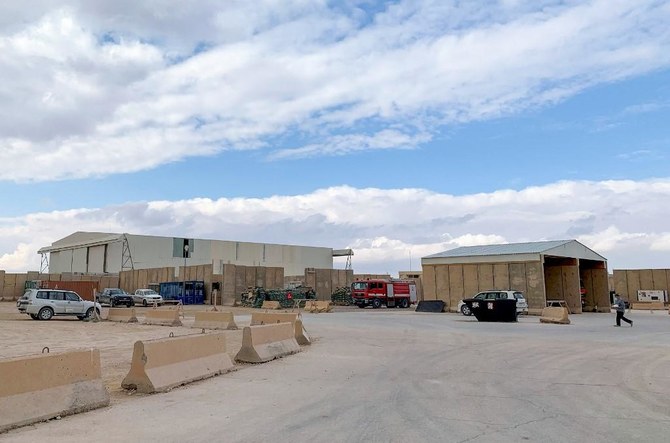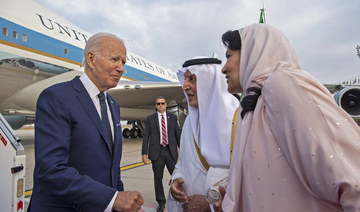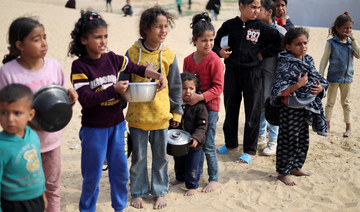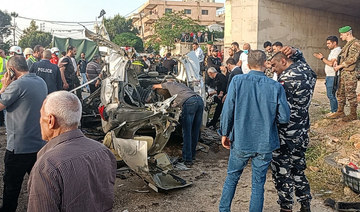DUBAI: The top US Air Force general in the Middle East warned on Thursday that Iran-backed militias could resume attacks in the region against the United States and its allies as tensions rise — assaults that could lead to a new Mideast escalation.
Speaking to journalists before stepping into his new role at Al-Udeid Air Base in Qatar, with responsibility for military operations in Iraq, Syria, Afghanistan, and across the region, Lt. Gen. Alexus Grynkewich also expressed fears over Russian and Chinese influence taking hold as superpowers vie for economic and military influence in the Middle East.
For instance, he said, recent US intelligence that Iran is preparing to send Russia armed and unarmed drones to use in its war on Ukraine “is not a surprise … but it’s concerning.”
Iran’s mission to the United Nations did not immediately respond to a request for comment.
Grynkewich, who had served as director of operations at Central Command in Tampa, Florida, thousands of miles from the baking desert outside of Doha, Qatar’s capital, spoke as regional tensions remain high over Iran’s rapidly expanding nuclear program and talks to revive Tehran’s nuclear deal with world powers at a deadlock.
“We’re in this position where we’re not under attack constantly, but we do see planning for attacks ongoing,” Grynkewich said. “Something will occur that unleashes that planning and that preparation against us.”
Iran tested a satellite-carrying rocket last month, prompting the White House to threaten more sanctions on Tehran to prevent it from accelerating its advanced ballistic missile program. And last week, as President Joe Biden toured the region, Iran unveiled armed drones on its warships in the Arabian Gulf.
Tehran has rapidly grown its stockpile of near-weapons-grade nuclear fuel in recent months, spreading fears about an escalation. It also has spun more advanced centrifuges prohibited under the landmark atomic accord, which former President Donald Trump abandoned in 2018.
“Everyone in the region is very concerned,” Grynkewich said.
Still in recent weeks, he said, US forces have seen a reduction in targeted attacks across the region, as a tenuous cease-fire between the Iran-backed Houthis and the Coalition to Restore Legitimacy in Yemen continues in the country and as an ongoing government formation process in Baghdad keeps Iran-backed militias in limbo, waiting for the political chaos to settle before they strike.
“We’re in a bit of a period of stasis,” Grynkewich said.
As other threats subside, the US has sharpened its focus on containing and countering Russian and Chinese influence in the region, Grynkewich said, noting that Russia is seeking to maintain the leverage it gained from years of military intervention in the region, such as in Syria where it helped save President Bashar Assad’s government and turned the tide of the war in his favor.
Grynkewich said an apparent reversal of the military relationship between Russia and Iran — with Moscow potentially interested in procuring drones from a traditional buyer of its own military equipment — “shows a bit more of a relationship than we’d like them to have, given the context of everything going on in Ukraine.”
Earlier this week, Russian President Vladimir Putin visited Tehran on a rare trip abroad and won staunch support from Iran for the war that has plunged the Kremlin deeper into confrontation with the West.
Meanwhile, China’s significant economic inroads in the region have raised concerns about the country’s plans “to secure those interests either through arms sales or other means,” Grynkewich said.
Despite appearances to the contrary after the withdrawal from Afghanistan, the US isn’t quitting the region, Grynkewich insisted, a case Biden made repeatedly on his Mideast tour last week.
With tens of thousands of American forces stationed across the Arabian Peninsula and some still in Iraq, as well as America’s superior military power, Grynkewich said, the US is trying to convince its allies that, “if you partner with us, you’re getting to get a relationship that’s much more deep and meaningful.”
Air Force official expects Iran to resume attacks on US
https://arab.news/cctq4
Air Force official expects Iran to resume attacks on US

- “We’re in this position where we’re not under attack constantly, but we do see planning for attacks ongoing,” Grynkewich said
- Iran tested a satellite-carrying rocket last month
Egypt mourns death of Iran’s president

- The Egyptian president expressed Egypt’s solidarity with the leadership and people of Iran during this tragic time
CAIRO: Egypt mourned the deaths of Iran’s President Ebrahim Raisi and Foreign Minister Hossein Amir-Abdollahian.
Egypt’s presidency said in a statement: “It is with deep grief and sorrow that the Arab Republic of Egypt mourns the death of the President of the Islamic Republic of Iran, Ebrahim Raisi, Iran’s Minister of Foreign Affairs Hossein Amir-Abdollahian and their escorts on Sunday in a tragic crash.
“President Abdel Fattah El-Sisi extends his sincere condolences to the people of Iran, asking Allah to envelop President Raisi and the deceased with his mercy and grant solace and comfort to their families.”
The Egyptian president expressed Egypt’s solidarity with the leadership and people of Iran during this tragic time.
Meanwhile, Egypt’s Minister of Foreign Affairs Sameh Shoukry extended his condolences to the Iranian government and people over the deaths of Raisi and Amir-Abdollahian, according to ministry spokesperson Ahmed Abu Zeid.
A helicopter carrying Raisi, Amir-Abdollahian, and several other officials crashed in mountainous terrain in the country’s northwest on Sunday. On Monday, Tehran announced the deaths of Raisi, Amir-Abdollahian, and their accompanying delegation in the crash.
Israel calls ICC prosecutor’s bid for PM arrest warrant a ‘historical disgrace’

- Katz denounced the move as a “scandalous decision” that amounted to “a frontal attack... on the victims of October 7“
- The minister added that Israel would establish a special committee to fight the ICC prosecutor’s efforts to secure a warrant
JERUSALEM: Israel on Monday slammed as a “historical disgrace” an application by the prosecutor of the International Criminal Court for an arrest warrant for Prime Minister Benjamin Netanyahu.
The prosecutor, Karim Khan, applied for arrest warrants against Netanyahu and Defense Minister Yoav Gallant as well as top Hamas leaders on suspicion of war crimes and crimes against humanity.
Foreign Minister Israel Katz said that Khan “in the same breath mentions the Prime Minister and the Minister of Defense of the State of Israel alongside the abominable Nazi monsters of Hamas — a historical disgrace that will be remembered forever.”
The prosecutor said he was seeking warrants against Netanyahu and Gallant for crimes including “wilful killing,” “extermination and/or murder” and “starvation.”
Katz denounced the move as a “scandalous decision” that amounted to “a frontal attack... on the victims of October 7” when Hamas launched their attack on Israel, sparking the Gaza war.
The minister added that Israel would establish a special committee to fight the ICC prosecutor’s efforts to secure a warrant, and also embark on a diplomatic push against it.
Katz said he planned to “speak with foreign ministers in leading countries of the world so that they oppose the prosecutor’s decision and announce that, even if orders are issued, they do not intend to enforce them on the leaders of the State of Israel.”
35,562 Palestinians killed in Gaza offensive since Oct. 7 — health ministry

- 106 Palestinians were killed and 176 injured in the past 24 hours
DUBAI: More than 35,562 Palestinians have been killed and 79,652 injured in the Israeli military offensive on Gaza since Oct. 7, the Gaza health ministry said in a statement on Monday.
One hundred and six Palestinians were killed and 176 injured in the past 24 hours, the ministry added.
Source close to Hezbollah says 4 dead in Israeli strikes on Lebanon

- The source close to Hezbollah told AFP that “at least four Hezbollah fighters were killed in Israeli raids on two different sites in southern Lebanon“
- The Israeli military said fighter jets struck “a Hezbollah terrorist cell”
BEIRUT: A source close to Hezbollah said four fighters were killed Monday in south Lebanon, with the Iran-backed group announcing two dead and a retaliatory attack, while Israel claimed strikes.
Hezbollah, a Hamas ally, has traded near daily cross-border fire with Israeli forces since the Palestinian group’s October 7 attack on southern Israel that sparked the war in Gaza.
The source close to Hezbollah told AFP that “at least four Hezbollah fighters were killed in Israeli raids on two different sites in southern Lebanon,” identifying the locations as Naqura on the coast and Mais Al-Jabal, a border village to the east.
The Shiite Muslim movement said two of its fighters, both from Naqura, had been killed, without providing further details.
The Israeli military said fighter jets struck “a Hezbollah terrorist cell” and a launch post in the Mais Al-Jabal area, while Israeli army “artillery fired to remove a threat” in the Naqura area.
Hezbollah said it launched a heavy rocket attack at an Israeli army barracks in the country’s north “in retaliation” for the Naqura strike, while also announcing other attacks on Israeli positions.
Lebanon’s official National News Agency (NNA) reported Israeli strikes on Mais Al-Jabal and Naqura, where it said Israel fired near Hezbollah-affiliated rescue personnel and wounded a civilian.
The fighting has killed at least 423 people in Lebanon, mostly militants but also including 82 civilians, according to an AFP tally.
Israel says 14 soldiers and 11 civilians have been killed on its side of the border.
The violence has raised fears of all-out conflict between Hezbollah and Israel, which went to war in 2006.
War monitor says Israeli strikes kill six pro-Iran fighters in Syria

- A Hezbollah source said that at least one fighter from the group was killed in Israeli strikes in the Qusayr area
Beirut: A war monitor said at least six pro-Iran fighters were killed Monday in Israeli strikes in Syria near the Lebanese border, in an area where Lebanon’s powerful Hezbollah group holds sway.
The Syrian Observatory for Human Rights said “Israeli strikes targeted two positions of pro-Iran groups in the Homs region,” including “a Hezbollah site in the Qusayr area” near the border where “six Iran-backed fighters were killed.”
The Observatory did not specify their nationalities.
A Hezbollah source told AFP that at least one fighter from the group was killed in Israeli strikes in the Qusayr area.
Israel rarely comments on individual strikes in Syria but has repeatedly said it will not allow its arch-enemy Iran to expand its presence there.
On Saturday, the Observatory said an Israeli drone strike near the Lebanese border targeted a vehicle carrying “a Hezbollah commander and his companion,” without reporting casualties.
Hezbollah did not announce any deaths among its ranks on Saturday.
On May 9, Israeli strikes on Syria targeted facilities belonging to Iraq’s Al-Nujaba armed movement, the Observatory and the pro-Iran group said, with Damascus saying an unidentified building was attacked.
The Israeli military has carried out hundreds of strikes in Syria since the outbreak of the civil war in its northern neighbor in 2011, mainly targeting army positions and Iran-backed fighters including from Lebanon’s Hezbollah group.
But the strikes increased after Israel’s war with Hamas in the Gaza Strip began on October 7, when the Iran-backed Palestinian militant group launched an unprecedented attack against Israel.
Syria’s war has killed more than half a million people and displaced millions more since it erupted in 2011 after Damascus cracked down on anti-government protests.






















